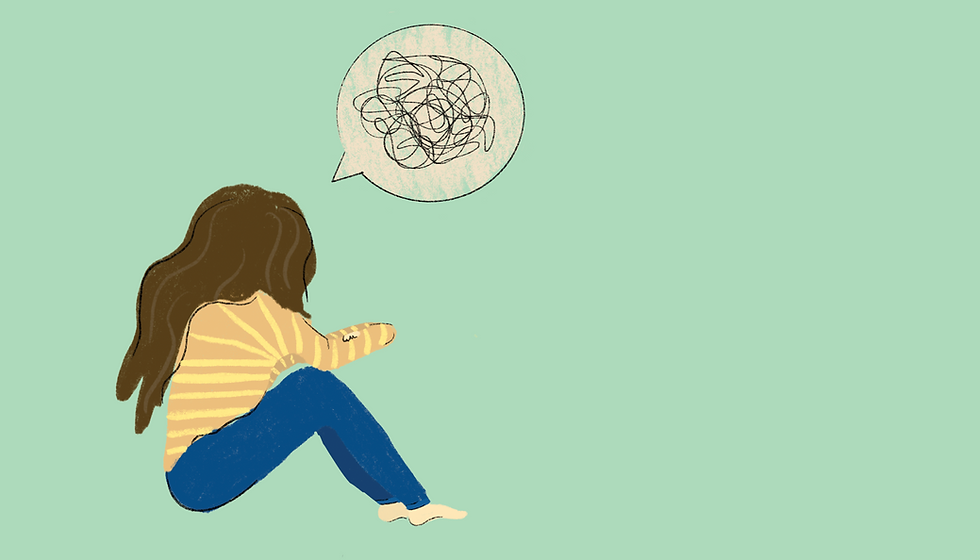Coping with Anxiety
- Oct 12, 2021
- 5 min read
Written by: Courtney Byrnes
Illustrated by: Emma Splete
What changes can be made to lessen anxiety symptoms?

Once widely considered taboo, many people are breaking the stigma and having open discussions around mental health.
In fact, a public statement in April 2021 from President Biden officially recognized May as National Mental Health Awareness Month. This proclamation helps broaden the conversation around mental health and comes at a time when many people face increased mental health stressors and barriers to healthcare due to the COVID-19 pandemic.
Although conversations about mental health are not limited to specific months, there seems to be no better time to have this discussion than in October. Along with being National Depression and Mental Health Screening month, October has weeks dedicated to mental illness awareness, OCD awareness and national health education. National Depression Screening Day and World Mental Health Day are also observed in October.
While October does not specifically focus on anxiety, nearly half of people diagnosed with depression also have an anxiety disorder, according to the Anxiety & Depression Awareness Association. The ADAA also finds that nearly 450 million people worldwide live with a mental illness, yet two-thirds never seek treatment.
The past year-and-a-half has also created a difficult situation for many in terms of mental health and receiving treatment.
In the midst of a healthcare crisis, there has been lurking a less-discussed mental healthcare crisis.
The COVID-19 pandemic and economic crisis deeply affected Americans’ mental health as they dealt with isolation and loss, whether that be of a job, routine, loved ones or health. In the midst of a healthcare crisis, there has been lurking a less-discussed mental healthcare crisis.
At a time when mental health services were increasingly needed, many faced barriers to access. With the healthcare industry overrun by the pandemic and people avoiding going out so as not to catch the virus, many did not seek out mental health treatment. With the pandemic ongoing, these barriers have not gone away. So, if you are suffering from anxiety, you may be looking for some temporary fixes.
While all decisions regarding mental health and treatment should be discussed with a licensed professional and tailored to each individual’s needs, here are some tips to help lessen anxiety.
Healthy Habits and Reminders
While it is easy to say “just cut out all stress from your life and you won’t have so much anxiety,” this is not always possible and may not even be helpful. If you have a stressful job that makes you completely unhappy, by all means, try to find a better situation. But you should not have to completely uproot your life and stop living because of anxiety.
Coping with anxiety is not about hiding from the world and living in fear, it is about forming a new relationship with your thoughts and creating healthy habits.
Evading all stress in life is impossible, and according to the ADAA’s Myths & Realities, “avoiding anxiety tends to reinforce it.” Coping with anxiety is not about hiding from the world and living in fear, it is about forming a new relationship with your thoughts and creating healthy habits.
The best thing you can do to lessen anxiety is to take care of both your mental and physical health. Here are some healthy habits and reminders to start changing your mindset:
Don’t be too hard on yourself: Hannah Montana said it best — Nobody’s perfect. And that is OK. Remind yourself that you are amazing for who you are, and be proud of how far you’ve come.
Laugh: Even if there is nothing to laugh at, laugh at yourself. Life is too short to take yourself too seriously. We all have embarrassing moments from the past to call on when we need a good laugh.
Think positively: If you start to feel anxious or have negative thoughts, recognize that — but don’t dwell on them. Instead, turn these around and focus on the positive.
Don’t try to control everything: You shouldn’t have to. Accept that some things are simply out of your control.
Treat yourself: Do what makes you happy, whether that’s grabbing your favorite comfort food at the grocery store, watching your guilty pleasure movie for the 500th time or splurging for some retail therapy.
Rest: Sleep helps us to reset from the day and gives our bodies and minds a much-needed break.
Eat right: Food is fuel for the body and mind, so what and how you eat matters. Make sure to get the right nutrients and don’t skip meals.
Limit alcohol and caffeine: Both affect the central nervous system — alcohol as a depressant and caffeine as a stimulant — and they can trigger an anxiety response or panic attack.
Exercise: This doesn’t have to be anything too rigorous; just aim to go on a walk or ride a bike for 30 minutes, 5 days out of the week.
Recognize your triggers: When you feel the onset of anxiety, take note of this — you could even start journaling your symptoms. The more you know about your anxiety, the better you will be able to cope with it.
Aromatherapy
There are no “instant cures” when it comes to treating anxiety and if there were, we probably would not find them on the shelves of Bath & Body Works.
Aromatherapy has gained popularity over recent years and oftentimes is specifically marketed to relieve anxiety, but be wary of the claims companies make. At the end of the day, they are just trying to make a profit. There are no “instant cures” when it comes to treating anxiety and if there were, we probably would not find them on the shelves of Bath & Body Works.
That is not to say that such products do not work; they very well may help to provide temporary relief at the height of an attack. However, they should not be used as the only form of treatment.
So how does this work? According to the Mayo Clinic, “aromatherapy is thought to work by stimulating smell receptors in the nose, which then send messages through the nervous system to the limbic system — the part of the brain that controls emotions.”
Aromatherapy uses essential oils that may be inhaled or applied to your skin. An array of essential oils can, depending on the fragrance and chemical makeup, provide relief for different ailments.
Lavender oil is one of the most popular essential oils. It is found to be quite relaxing and is often used to relieve stress and anxiety and promote good sleep.
Bath & Body Works’ Aromatherapy line includes Stress Relief products that use eucalyptus to clear the mind and spearmint to soothe and uplift.
Another company, Essence, has created a product to discreetly take aromatherapy with you and enjoy its benefits throughout your day. Their nasal diffuser is a silicone nose ring infused with essential oils that is clear and small enough to go largely unnoticed — especially now with mask wearing.
Products like these can provide temporary relief and help you stay calm. Sometimes it is enough to know that you have relief close by if needed, to put your mind at ease. But they may not work for all.
Coping with anxiety has a lot more to do with your thoughts and attitude; if something causes you to dwell more on your anxiety, it probably will not provide you with much relief.






